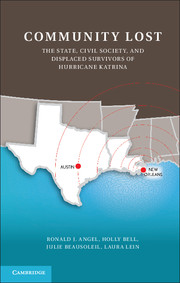Book contents
- Frontmatter
- Contents
- Acknowledgments
- Introduction
- 1 After the Storm
- 2 An Emerging Methodology for a Crisis Situation
- 3 Life before the Storm
- 4 Evacuation and Arrival in Austin
- 5 The Limited Transportability of Social Capital
- 6 Civil Society, NGOs, and the Grassroots Response
- 7 Housing, Employment, and Identification
- 8 Health Care and the Limitations of Civil Society
- 9 The State, Civil Society, and the Limitations of Social Capital
- Bibliography
- Index
2 - An Emerging Methodology for a Crisis Situation
Published online by Cambridge University Press: 05 June 2012
- Frontmatter
- Contents
- Acknowledgments
- Introduction
- 1 After the Storm
- 2 An Emerging Methodology for a Crisis Situation
- 3 Life before the Storm
- 4 Evacuation and Arrival in Austin
- 5 The Limited Transportability of Social Capital
- 6 Civil Society, NGOs, and the Grassroots Response
- 7 Housing, Employment, and Identification
- 8 Health Care and the Limitations of Civil Society
- 9 The State, Civil Society, and the Limitations of Social Capital
- Bibliography
- Index
Summary
CASE STUDIES: TWO FAMILIES
Ted Johnson, an African American male, and his wife are both physical therapists who left New Orleans in their own car before Hurricane Katrina struck. The couple has two boys, and eventually the family relocated permanently in Austin. The decision to relocate was not a spur-of-the-moment one, nor was it made without qualms. The couple’s disillusionment with New Orleans had been growing for some time. The storm was the catalyst that forced the choice because it made evacuation necessary and it began a series of events that ultimately resulted in their decision not to return.
The Johnsons’ story is not typical of survivors in our sample and illustrates the importance of high levels of social and human capital in determining a successful relocation. As we will see, those families that were able to evacuate themselves had in general more material and social resources and were more successful in reestablishing their lives in Austin or in resuming their lives in New Orleans. The second case we present is of a family with far fewer resources and less human, material, or social capital that could not evacuate on their own. The capacity of individuals and families in similar situations to reestablish their lives, which were often precarious to begin with, was very limited and the outcome much less favorable.
- Type
- Chapter
- Information
- Community LostThe State, Civil Society, and Displaced Survivors of Hurricane Katrina, pp. 34 - 54Publisher: Cambridge University PressPrint publication year: 2012



